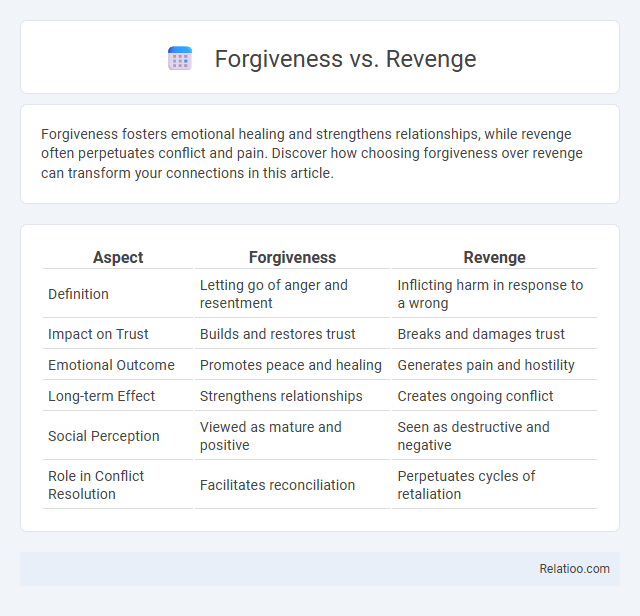Forgiveness fosters emotional healing and strengthens relationships, while revenge often perpetuates conflict and pain. Discover how choosing forgiveness over revenge can transform your connections in this article.
Table of Comparison
| Aspect | Forgiveness | Revenge |
|---|---|---|
| Definition | Letting go of anger and resentment | Inflicting harm in response to a wrong |
| Impact on Trust | Builds and restores trust | Breaks and damages trust |
| Emotional Outcome | Promotes peace and healing | Generates pain and hostility |
| Long-term Effect | Strengthens relationships | Creates ongoing conflict |
| Social Perception | Viewed as mature and positive | Seen as destructive and negative |
| Role in Conflict Resolution | Facilitates reconciliation | Perpetuates cycles of retaliation |
Understanding Forgiveness: Definition and Importance
Understanding forgiveness involves recognizing it as a conscious decision to release resentment and anger toward someone who has caused harm, promoting emotional healing and psychological well-being. Forgiveness reduces stress, lowers blood pressure, and fosters mental peace, making it a crucial component for personal growth and healthy relationships. Unlike revenge, which perpetuates suffering, forgiveness offers a transformative path toward redemption and reconciliation.
The Psychology Behind Revenge
The psychology behind revenge centers on the human desire to restore a sense of justice and control after experiencing harm or injustice, often driven by intense emotions like anger and humiliation. Studies show that seeking revenge activates reward-related brain regions, providing a temporary feeling of satisfaction despite long-term negative consequences. Understanding these psychological mechanisms highlights why individuals may struggle to move towards forgiveness or redemption, as revenge offers an immediate but ultimately self-destructive coping strategy.
Emotional Impact: Forgiveness vs Revenge
Forgiveness releases your emotional burden, fostering inner peace and healing by letting go of anger and resentment. Revenge intensifies negative emotions, trapping your mind in cycles of bitterness and conflict that hinder emotional growth. Choosing forgiveness over revenge strengthens emotional resilience and promotes healthier relationships.
Long-Term Effects on Mental Health
Forgiveness promotes long-term mental health by reducing stress, lowering anxiety, and enhancing emotional well-being through letting go of resentment. Revenge often perpetuates negative emotions, increasing stress and fostering cycles of anger and hostility that impair psychological stability. Redemption fosters self-growth and healing, enabling individuals to rebuild self-esteem and achieve sustainable mental resilience by acknowledging past mistakes and making positive changes.
Societal Views: Cultural Perspectives on Forgiveness and Revenge
Societal views on forgiveness and revenge vary significantly across cultures, shaping moral values and conflict resolution approaches. In collectivist societies, forgiveness is often emphasized to restore group harmony, while revenge may be seen as a violation of social cohesion. Your understanding of these cultural perspectives can enhance empathy and promote more effective interpersonal relationships within diverse communities.
Conflict Resolution: Which Path Leads to Healing?
Forgiveness fosters emotional healing by releasing resentment and promoting inner peace, while revenge perpetuates conflict and deepens wounds, undermining your ability to move forward. Redemption offers a transformative path where accountability and change restore trust and rebuild relationships. Choosing forgiveness or redemption navigates the conflict resolution landscape toward lasting healing and personal growth.
Forgiveness in Relationships: Rebuilding Trust
Forgiveness in relationships plays a crucial role in rebuilding trust by allowing emotional wounds to heal and fostering open communication between partners. It involves acknowledging hurt, expressing genuine remorse, and making consistent efforts to change harmful behaviors, which strengthens the foundation of mutual respect and understanding. Research shows that couples who practice forgiveness experience higher relationship satisfaction and long-term stability compared to those who dwell on revenge or avoid addressing conflicts.
The Pitfalls of Pursuing Revenge
Pursuing revenge often traps you in a cycle of negativity that impairs emotional well-being and damages relationships. Unlike forgiveness, which promotes healing, revenge intensifies conflict and prolongs pain, making true peace elusive. Prioritizing redemption enables growth and transformation, offering a constructive path beyond the pitfalls of retaliation.
Case Studies: Real-Life Examples of Forgiveness and Revenge
Case studies reveal that forgiveness often leads to psychological healing and restored relationships, exemplified by Nelson Mandela's reconciliation efforts post-apartheid. In contrast, revenge frequently perpetuates cycles of violence and trauma, as seen in feuds and retaliatory attacks in various conflict zones. Redemption stories, such as those of former offenders who seek atonement, highlight the transformative power of accepting responsibility and pursuing positive change.
Choosing Forgiveness for Personal Growth
Choosing forgiveness fosters emotional healing by releasing resentment and promoting inner peace, which strengthens your mental well-being and resilience. Forgiveness encourages empathy and understanding, breaking cycles of negativity and allowing personal growth to flourish. Unlike revenge, which perpetuates pain and conflict, forgiveness opens pathways to redemption and lasting self-improvement.

Infographic: Forgiveness vs Revenge
 relatioo.com
relatioo.com